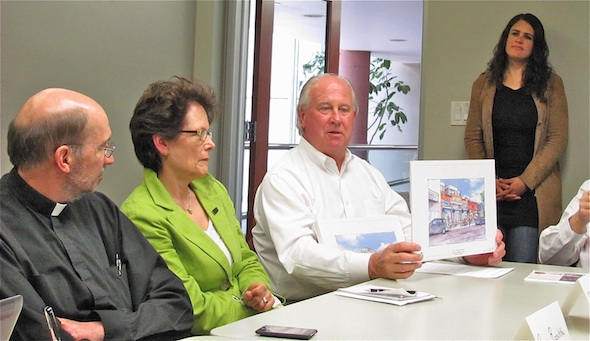The Hill: a growing groundswell for redevelopment
Bob Wells | May 16, 2010

Panelists at a PLAN Boulder County lunchtime meeting Friday, Oct. 14, all agreed that the University Hill commercial district — a pizza-slice wedge of businesses separating the University of Colorado campus from the Hill’s residential streets — is overdue for redevelopment.
Molly Winter, director of the University Hill Commercial Management Commission, said a group called the Hill Ownership Group had come up with seven big ideas for how to bring “catalytic change” to the Hill, ideas that would bring “a lttle more diversity of uses” to the Hill and make it “more open to the broader community.” The group, she added, doesn’t want the Hill to be a second Pearl Street Mall but rather something quite different.
Steven Walsh, architect and co-owner of The New Hill Company, a consultancy that advises people about development on the Hill, said the Hill needs a way to aggregate smaller properties into bigger ones so that serious redevelopment can occur. A study released by his last year recommended the use of “overlay zoning” to achieve this end, and also stressed the dire need for more parking if the Hill is to become a viable shopping and activity venue.
Mike Boyer, a Hill property owner and developer, said “higher-quality merchants” want to locate on the Hill, but won’t do so given the quality of the current buildings and the rents being charged. Current owners (“I don’t want to call them slum landlords,” he smiled) “have had their way with tenants for 35 years.” Picking up on Walsh’s point, he said: “We can redevelop all we want but without more parking the quality retailers won’t come.”
Rev. Ron Raschke, pastor of Grace Lutheran Church on 13th St. on the Hill, said a goal being promoted by Hill stakeholders is for the City to designate the Hill as a cultural district, “a place where the city and the university meet,” where events could be held that present the research and visionary ideas of CU intellectuals to a larger community. A group will be convening this summer to help make the cultural district happen, he said.
Bill Shrum, a Hill merchant and co-chair of the University Hill Commercial Management Commission, lamented the fact that the Hill, unlike downtown Boulder, is not thriving. Hill businesses, he said, pay high rents and get little for them. The City’s role has until now consisted of “nothing but study after study,” and it’s now time for action, he said.
In the ensuing discussion, led by moderator Eric Karnes, a consensus emerged that street-level parking is a poor use of the Hill’s scarce space, and that the Hill will definitely need underground parking. There was also a strong consensus that street redesigns are needed to allow easy access from Broadway to Hill parking. Everyone seemed in agreement that a general improvement district should be created in order to amass money to buy out existing landlords and assemble larger, developable land parcels.
Asked to comment to the group, Mayor Susan Osborne voiced excitement about the improvement-district idea and added that City funding might be available from three different budgets — energy, economic-vitality and the arts — to support Hill improvements.
Hillary Griffith, co-chair of the Hill management commission and creator of the successful “Hill Flea” outdoor market, voiced support for giving a role to Boulder’s entrepreneurs, artists, new media/tech devotees and “green” community leaders of all ages in planning the Hill’s future.
PLAN Boulder County hosts periodic meetings, both at the main library and at a downtown restaurant, where people seriously involved in city-planning issues talk shop, sometimes in excruciatingly technical detail. You can sign up for advisories about future meetings on the group’s website.
(FOR MORE INFORMATION: Read an account of the issue and of this meeting by Alan Boles in The Blue Line.)

